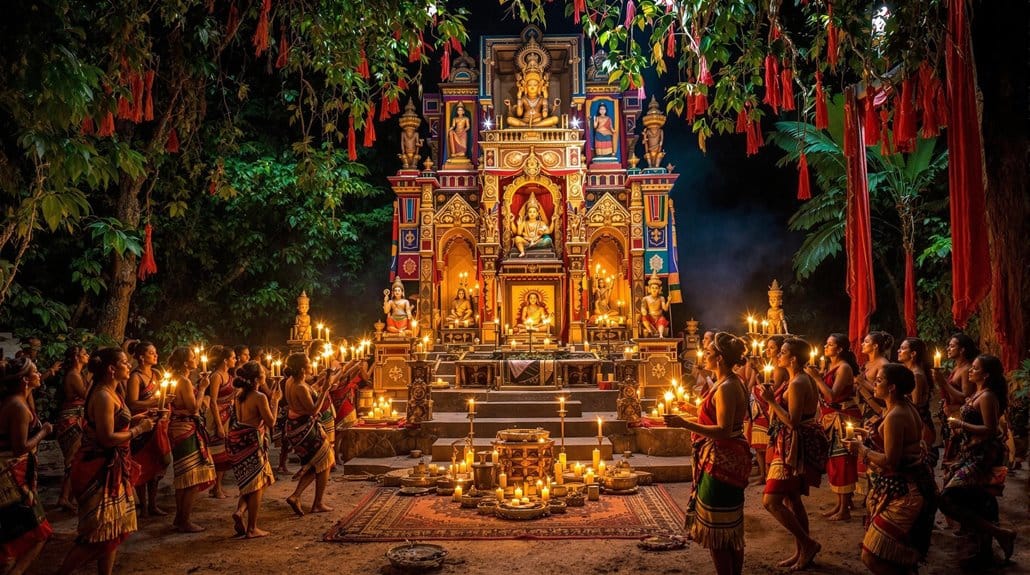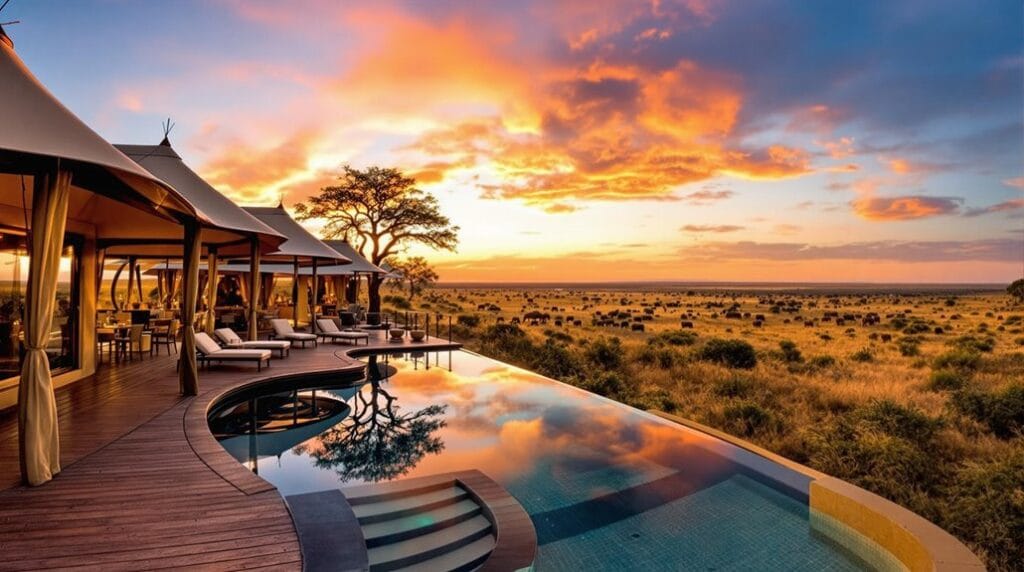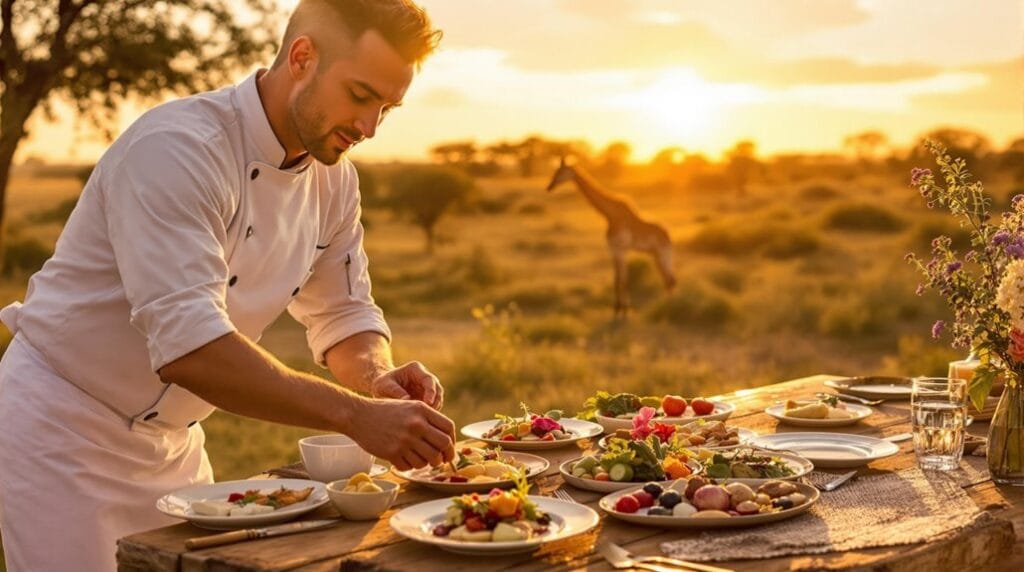When you explore the rich tapestry of ancestral worship traditions in Africa, you'll find practices that not only honor the past but also strengthen cultural bonds. The Yoruba, Zulu, Akan, Xhosa, and Maasai communities each offer unique rituals that reflect their deep respect for lineage. From vibrant ceremonies to communal gatherings, these traditions serve as crucial links to ancestral wisdom. But what exactly makes each of these practices distinct, and how do they impact contemporary life? Keep following to uncover the profound significance behind these ancestral connections.
Key Takeaways
- Yoruba tradition emphasizes ancestral worship through festivals, rituals, and sacred spaces to maintain connections and seek blessings from ancestors.
- Zulu practices integrate daily interactions with ancestors, celebrating life transitions and ensuring protection through rituals and communal music and dance.
- Akan spirituality focuses on ancestor veneration, utilizing rituals like libations and festivals to foster community ties and reflect on ancestral wisdom.
- Xhosa rituals highlight respect for the deceased, utilizing food offerings and gatherings to maintain harmonious relationships and prevent misfortune.
- Maasai vibrant rituals include singing and dancing at gravesites, reinforcing respect for ancestors and ensuring continuity of cultural values and identity.
The Yoruba Tradition
The Yoruba people's ancestral worship tradition is a vibrant tapestry woven from their rich cultural heritage and deep respect for lineage. In this tradition, you'll find that ancestor worship isn't just a ritual; it's a profound expression of belonging and continuity. The ancestors, or "egungun," are believed to hold significant spiritual power, guiding and protecting their descendants.
During annual festivals, family members don elaborate masks and costumes, embodying their deceased relatives to honor them. Yoruba tradition intricately intertwines the veneration of these ancestors with the worship of "orishas," a pantheon of deities that serve as intermediaries between the living and the divine.
Through rituals such as "ileya," where offerings of food and drink are made, you seek blessings for health and prosperity. Ancestral shrines in homes become sacred spaces where daily prayers and rituals reinforce your connection to your lineage.
Ultimately, engaging in these spiritual practices fosters a sense of belonging, grounding you in a world where the past and present converge, and where the wisdom of ancestors shapes your path forward. The Yoruba tradition truly embodies the essence of honoring those who came before you, enriching both your spirit and community.
The Zulu Ancestral Practices
In Zulu culture, ancestral practices form a significant part of daily life, echoing the deep-seated belief that ancestors remain actively involved in the lives of their descendants. These spiritual practices aren't just rituals; they're a lifeline connecting you to your heritage and community.
The Zulu engage in various ceremonies that honor their ancestors, with the following key traditions standing out:
- Umemulo: This rite of passage celebrates a young woman's progression to adulthood, offering a moment to honor her ancestors through rituals and offerings.
- Consulting Amadlozi: By seeking guidance from ancestral spirits, you reinforce your connection to the past, ensuring their protection and influence over your life.
- Sacred Spaces (Izithakazelo): These areas are essential for performing rituals and making offerings, allowing you to pay respect to your lineage and appease your ancestors.
Music and dance play an integral role in these ceremonies, invoking a sense of communal identity and belonging.
As you participate in these vibrant traditions, you not only honor your ancestors but also weave the fabric of cultural identity that binds the Zulu community together.
The Akan Spirituality
Harmony with ancestral spirits permeates Akan spirituality, practiced chiefly by the Akan people of Ghana and Ivory Coast. At the heart of this rich tradition is ancestor veneration, where you actively engage in rituals and offerings to honor those who came before you. These ancestral spirits are believed to provide crucial guidance and blessings, intertwining the past with the present.
Central to Akan spirituality is the Abosom system, where various lesser deities represent natural elements and ancestral lineages. This system fosters a deeper connection with both the divine and your community, reinforcing bonds through shared beliefs and practices.
Rituals like pouring libations or celebrating important festivals, such as Adae and Homowo, play significant roles in nurturing community cohesion.
Moreover, the sankofa concept encourages you to reflect on the wisdom of your ancestors, urging you to return to your roots to learn and grow. Emphasizing the supreme god, Nyame, the Akan spirituality creates a profound sense of belonging, linking you not just to your ancestors, but to an enduring legacy that informs your identity and guides your future.
The Xhosa Rituals
Ancestral worship among the Xhosa people of South Africa embodies a deep-seated respect for those who've passed, intertwining their lives with the guidance of ancestral spirits known as "amaXhosa." Engaging in rituals like the umngqusho ceremony, where traditional foods are offered, you actively participate in honoring these revered ancestors who are believed to influence daily decisions and life paths.
Here are three key aspects of Xhosa rituals:
- Umngqusho Ceremony: This ritual involves preparing and offering traditional foods to the ancestors, reinforcing community ties and gratitude.
- Ukuthwasa Initiation: This important rite prepares individuals to communicate with the spirit world, facilitating a deeper connection with ancestral guidance.
- Ukukhumbula Gatherings: These community gatherings serve to remember and celebrate deceased ancestors, fostering cultural identity through shared stories and rituals.
The Xhosa belief system emphasizes maintaining a harmonious relationship with ancestors, as their displeasure can bring misfortune.
Through these rituals, you not only honor the amaXhosa but also strengthen the communal bonds that tie you to your roots, ensuring their wisdom continues to guide present and future generations.
The Maasai Ancestor Veneration
Often, the Maasai people of East Africa engage in vibrant rituals to honor their ancestors, reflecting a profound respect for those who've passed. This practice of ancestor veneration is central to Maasai culture, as they believe that their deceased relatives actively influence the community's well-being.
Through rituals like singing and dancing at gravesites, you can witness the deep connection between the living and their ancestors, reinforcing familial bonds and shared histories.
Elders in Maasai society serve as custodians of ancestral knowledge, guiding younger generations in these essential spiritual practices. Their authority is respected, as they offer insights into honoring the spirits who provide guidance in daily life.
You'll find that offerings of food and drink at ancestral graves are common, seen as a way to appease the spirits and invite blessings.
In this vibrant community, every ritual is more than a tradition; it's a significant thread in the tapestry of life that intertwines the past with the present.
The Maasai's approach to ancestor veneration not only celebrates their heritage but also guarantees the continuity of values that sustain their identity and way of life.
Frequently Asked Questions
How Do Africans Worship Their Ancestors?
You participate in community rituals, making ancestor offerings to honor spirits, preserving family lineage. This spiritual connection reflects cultural significance, integrating respect practices and belief systems that strengthen your identity and foster a sense of belonging.
What Are the Three Major African Religious Traditions?
You'll discover that the three major African religious traditions—Traditional African Religions, Christianity, and Islam—intertwine ancestral veneration rituals, cultural significance, and community gatherings, enriching lineage and identity through spiritual offerings, festivals, and oral traditions.
What Are the Traditional African Forms of Worship?
In traditional African forms of worship, you'll engage in sacred rituals, ancestral offerings, and community gatherings, reflecting historical beliefs. Reverence practices and divination methods preserve cultural heritage, emphasizing spiritual significance and symbolic representations of identity and connection.
What Is the Ancestor Shrine in Africa?
Imagine a sacred space where family lineage recognition thrives. An ancestor shrine embodies cultural heritage preservation through traditional offerings practices and veneration rituals, fostering spiritual connection importance and community role in worship that binds generations together.
Conclusion
In exploring Africa's rich ancestral worship traditions, you can't help but wonder: how do these practices shape modern identities and community bonds? Each tradition, from the Yoruba's vibrant festivals to the Maasai's sacred ceremonies, reveals a profound respect for lineage and heritage. These rituals not only honor ancestors but also foster unity and continuity within cultures. By embracing these practices, we connect with a deeper understanding of our shared humanity and the legacies that define us.








